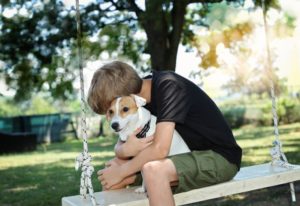Dividing Personal Property after a Divorce: Pets

Livestock refers to animals that are owned and/or bred to make money. Unless an animal has been making more money than it has been absorbing, it is a pet. Pets are animals that are owned to provide companionship or to share recreational activities with their owners such as the role filled by hunting dogs. Admittedly, animals can fill dual roles being both pets and livestock that earn money. However, what distinguishes pets in the division of marital estates and can cause significant problems is the emotional attachment that develops between owners and pets. The emotional attachment that owners can develop for their pets can actually rival those that owners develop in human to human relationships. Consequently, some care must be exercised in the disposition of the animals.
It is highly unlikely that pets will be sold as a process of the divorce. This means that a value may have to be placed on the animals for marital estate division purposes
A dog with marketable skills (e.g. hunting or tracking) or has genetic lines favorable for breeding purposes may have a market value. This value can be determined by the processes employed to value any other asset. That is, the parties can agree on a value, reference can be made to trade magazines or Internet markets, or as a last resort, an individual knowledgeable in the field can be engaged to assess the value of an animal. However, in the vast majority of cases, the dollar value of pets is zero. In fact in most cases, the dollar value of pets is a negative number that will vary directly in proportion to the attachment that has developed between pet and owner. The more attachment owners have, the more they will spend to enhance and prolong the life of their pet.
Pets usually bond more with one individual in a family than equally to all family members, and that member is usually the one who feeds the pet. Allowing the pet to go with the person to whom it is bound will be less traumatic to the pet.
A relationship can also develop between children of the marriage and pets. For example, dogs may develop a littermate relationship with the children. Pets can also be instrumental in easing the transition from living in one household to living in two for the children. If the pet is allowed to accompany the children when they change residences, they will have a familiar constant in both households.
Splitting up property, including pets, is never an easy conversation to have during a divorce. Contact an experienced Houston divorce lawyer to help guide you through this divorce process and keep things as stable as possible for your children. To learn more about our services, contact Slate & Associates today.




